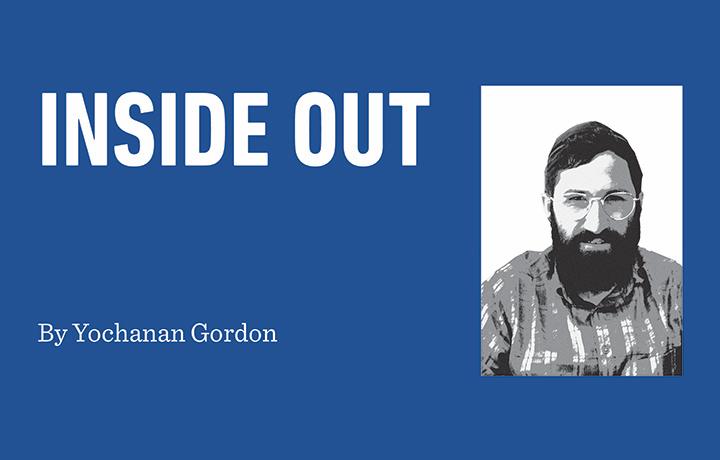(Don’t) Sweat The Small Stuff
By Yochanan Gordon
This article has been proofread and edited by a number of editors. Before it was completed and sent to them, it went through visions and revisions until it was satisfactory enough to move along the chain.
Every production—be it an article, a documentary, or a movie—has a process through which it is refined before it is ready to be released in its best form. Yet there’s something appealing about giving the audience a backstage view of that evolution. Think of it as a before-and-after picture in motion. Often, one would have to subscribe to a special service to access such behind-the-scenes material.
I begin this way because this column, too, had an evolutionary process, and I want to take you on that tour while sharing the idea that was born through it. It was Monday evening when I realized I hadn’t yet written my column for the week—and had no inkling of what I wanted to write about. Truthfully, that’s not uncommon. Writer’s block is a frequent visitor for those of us who work from inspiration. There are stretches when the creative well feels dry.
This column began five years ago. At the time, I had a thought that fit the name I came up with that day—“Inside Out”—but I never imagined I’d still be maintaining it years later. My vision was to peel away the outer layers of Torah, yomim tovim, and even the seemingly ordinary moments of daily life to introduce my readership to the inner workings of creation.
It was my attempt at hafotzas hama’ayanos—disseminating the wellsprings of the Baal Shem Tov’s teachings and the penetrating thought of penimiyus haTorah to infuse life with depth and new meaning. But producing about a thousand words a week that fit that mold is no small feat. In those early “blank screen” moments, I’d simply write, hoping that someone, somewhere, would find meaning in my observations.
Then came the epiphany: somehow, every week, an idea would come to me—not mine, but given to me—that I could develop into the column. I type, I watch the words appear, but I know they’re not fully my own.
On Tuesday morning, a verse from the book of Isaiah was ringing in my head: “From the edge of the earth we have heard songs” (24:16). A strange verse to surface—I’m not learning Nach now, and it hasn’t appeared in any recent haftarah. But its very presence told me the column would grow from it.
Then another verse surfaced from this week’s parshah, Eikev: “For not by bread alone does man live; rather, by every utterance from G‑d’s mouth does man live” (Devarim 8:3). On the surface, it means that while food seems to sustain us, it’s actually the Divine utterance within the food that gives life.
But bread, in Torah language, is often a euphemism for Torah itself—as Shlomo HaMelech writes in Mishlei: “Lechu lachamu b’lachami” (9:5). And so, in moments when no “big idea” in Torah comes to mind, when one might feel empty or caught in a bout of katnus hamoichin (constricted consciousness), the truth is: Torah is everywhere. There is no moment, no object, outside of it.
The Baal Shem Tov famously reinterpreted a Mishnah in Pirkei Avos: “One who walks alone and ceases his learning to admire a tree is liable with his soul.” Far from discouraging wonder, the Baal Shem Tov taught that stopping to marvel at G‑d’s creation is not a break from Torah at all—provided you see the Creator behind it.
So when the verse says, “Not by bread alone,” it’s teaching: yes, Torah is “bread,” but all else—every detail of creation—falls under “kol motza pi Hashem,” “every utterance from G‑d’s mouth.” If you can see Him in it, it will give you life.
This aligns perfectly with the Chassidic doctrine of hashgachah pratis—that even in moments of darkness, when G‑d seems absent, He is most present. Which leads back to the opening of the parshah: “V’hayah eikev tishme’un.” Rashi explains eikev, “heel,” as a reference to mitzvos that people trample because they seem insignificant. But nothing is insignificant. The very places we assume He is absent are, in truth, where His presence is most essential.
And so we return to the verse, “Mi’knaf ha’aretz zemiros shamanu”—“from the edge of the earth we have heard songs.” The “edges” are the castaway moments, the fringes of life, which the prophet assures us will one day erupt in song.
King David was chastised for calling Torah zemiros—as though it were merely the melody that offered him escape from hardship. Zimra also means to prune, to cut away. The rebuke was for implying that some parts of life could be discarded.
But in G‑d’s world, nothing is disposable. Every moment, every place—even those that feel like the heel of the foot, trodden and insignificant—carries His utterance, His presence, His life-force. One day, the “edges” will sing—not because they were meaningless, but because they were always part of the music.
Yochanan Gordon can be reached at [email protected]. Read more of Yochanan’s articles at 5TJT.com.










